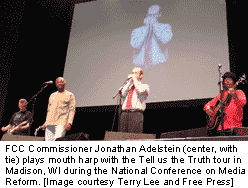This was initially posted to the “Be the Media Blog” which provided a running commentary on the National Conference on Media Reform as written by participants.
Saturday night @ the Orpheum, after all of the speeches got done (C-SPAN was there), the Tell Us the Truth tour gang ran through an abbreviated reprise of their Friday headline performance.
This time around, however, FCC Commissioner Jonathan Adelstein joined the lineup. Adelstein’s quite dangerous with the harmonica, and performed several solos backed up by Boots Riley, Billy Bragg, Tom Morello, and Lester Chambers, to a repeatedly wowed crowd. Wonderfully surreal!
It looked like Adelstein got quite an adrenaline rush out of the (well-deserved) adulation, which perhaps explains the comments he made during a brief conversation with him after the show.
My initial mission was to record station IDs for the representatives of microradio outlets that were attending the conferences. The musicians were all quite cooperative, but when I approached Commissioner Adelstein he said he wasn’t allowed to do such things. Some sort of legal conflict with his position as a radio regulator, he’s careful not to do anything that could be seen as promotion for any station.
While I had his attention I decided to hit Adelstein up on a couple of radio-related issues. The first was about the dangers facing radio due to its ill-conceived (yet ongoing) digitalization. Adelstein sounded like he didn’t know much about it, and since it’s not registering on his radar as an imminent policy issue he didn’t seem too fazed by my concerns, although he did invite me to e-mail him.
 (A side note: Commissioners Adelstein and Michael Copps use e-mail quite heavily – the friendly tech who set up our MP3 webcast servers for the weekend once emailed Copps with some concerns on FCC policy re: telco/cable company competition. He received an articulate and thoughtful response back from Copps within eight minutes.)
(A side note: Commissioners Adelstein and Michael Copps use e-mail quite heavily – the friendly tech who set up our MP3 webcast servers for the weekend once emailed Copps with some concerns on FCC policy re: telco/cable company competition. He received an articulate and thoughtful response back from Copps within eight minutes.)
My second point was about microradio. During Saturday’s show emcee John Nichols announced the presence of the live webcast to the crowd, and noted that it had been simulcast on the FM dials of a half-dozen stations around the country (both licensed and otherwise). So Commissioner Adelstein knew there was piracy in the air (of which he had been a participant by performance).
I basically reiterated that fact, and told him that regardless of any possible expansion of LPFM there is much more the FCC could do to expand access to the airwaves. I explained that microradio stations, in general, view broadcasting as an act of electronic civil disobedience and that the public reclamation of the airwaves was already happening, irrespective of the weekend’s rhetoric to get it started.
Commissioner Adelstein’s response?
“Go for it.”
As I stood dumbstruck, Commissioner Adelstein filled the conversational void. “Of course it is my job to enforce the law, but I can’t personally enforce every law every day.” I finally got the wits enough to respond, “Go for it?”
“Sure,” he smiled. “Hey, I’ve been a renegade, too, once or twice in my life.”
With that, I backed off and returned to where tha webcast crew was breaking down the gear. I could kick myself for not setting Paul’s PDA to record the exchange after getting denied station IDs.
Jonathan Adelstein is apparently not the first FCC commissioner to all but endorse unlicensed microbroadcasting. At a public forum in Vermont Michael Copps expressed general support for microradio stations, especially for the way they attack the boundaries that limit public access to the airwaves.
With regard to the LPFM service itself, Adelstein thinks the FCC will sign off “very soon” on a formal recommendation to Congress to expand LPFM by removing the overbroad interference protections that are strangling its full-scale national rollout. He met my skepticism with the revelation that FCC Chairman Mikey Powell might be prepared to move on LPFM partially as an act of revenge against the broadcast industry for hanging him out to dry in the controversy that resulted over the FCC’s June attempt to relax media ownership rules. We agreed on the notion that Congress may be a stumbling block, as any expansion will require its approval. With media a hot issue on the Hill, methinks there is room for some legislative end-running in a positive direction (riders to spending bills can work both ways, suckas).
A final note: the latest coverage in Madison’s local rightwing daily rag predictably misses the point of the entire f*cking weekend, actually managing to write a story on the conference omitting any direct reference to the fundamental issues discussed there.
Skip to content